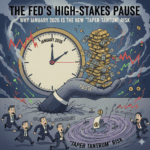U.S. Customs agents began collecting a new 10% tariff on imports from numerous countries starting Saturday, marking a dramatic shift in American trade policy under President Donald Trump. These baseline tariffs took effect at ports, airports, and customs warehouses at 12:01 a.m. ET, representing a full departure from the post-World War II model of mutually negotiated trade agreements.
Higher “reciprocal” tariffs—ranging from 11% to 50%—will take effect on Wednesday, targeting goods from 57 major trading partners. European Union products will face a 20% levy, while Chinese goods will be hit with a 34% duty, increasing total tariffs on Chinese imports to 54%.
“This is the biggest trade action of our lifetime,” said Kelly Ann Shaw, a trade lawyer at Hogan Lovells and a former White House adviser. Speaking at an event at the Brookings Institution, Shaw said tariffs are likely to change as countries seek to negotiate reductions, but she described the policy as a “seismic shift” in global trade dynamics.
Trump’s announcement on Wednesday triggered significant market turbulence. By Friday’s close, S&P 500 companies had lost $5 trillion in market value—a record two-day decline. Commodity and oil prices tumbled, and investors flocked to the safety of government bonds.
Countries affected by the initial 10% tariffs include Australia, Britain, Colombia, Argentina, Egypt, and Saudi Arabia. Although one Customs and Border Protection bulletin initially stated there would be no grace period for shipments in transit, a separate bulletin clarified that cargo loaded before 12:01 a.m. ET Saturday would be exempt if it arrives by May 27.
Vietnam, which previously benefited from U.S. supply chains shifting away from China, will face a 46% tariff. On Friday, the country agreed to begin trade talks with the Trump administration.
Canada and Mexico are exempt from these new tariffs, as they remain subject to a separate 25% duty tied to compliance with U.S.-Mexico-Canada Agreement rules and fentanyl-related trade concerns.
Products already covered under existing national security tariffs—including steel, aluminum, automobiles, and parts—are excluded from the new levies. Additionally, the administration released a list of over 1,000 exempt product categories, covering approximately $645 billion in 2024 imports. These include crude oil, petroleum, energy products, pharmaceuticals, uranium, titanium, lumber, semiconductors, and copper. Aside from energy, many of these sectors are under review for potential future national security tariffs.















